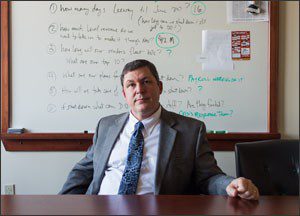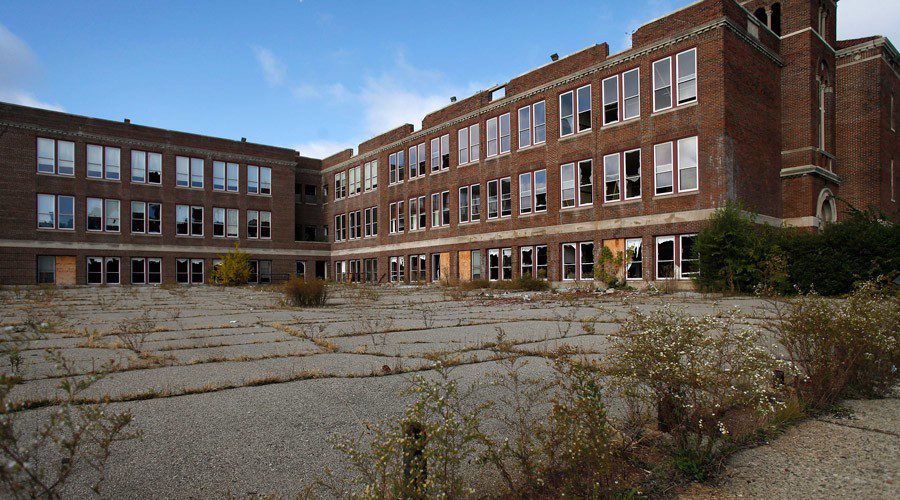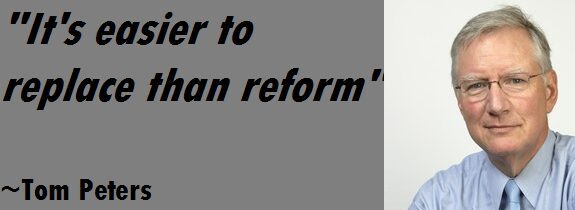Decades of “reform” accompanied by piles of money have failed to improve education. Can entrepreneurs outside the system make it work?
In 2016, the Erie (PA) school board made a stunning gambit by threatening to permanently close all four of the city high schools unless the state of Pennsylvania sent more dollars for public education in the city by the lake.
“It’s a matter of equity”, according to then superintendent Jay Badams, “We simply can’t offer them close to the same experience their peers in other districts have locally.”

While the closure threat was just a piece of cheap political theater, it got many to think that dismantling the high schools could be the best news Erie kids received in 50 years.
An Institution Removed From The Public
What drives most public school employees is their near-religious belief that they are the last guardians of education against meddling parents, corporate interests, and a political process gone insane. From this perspective, school leaders simply cannot see themselves as the root of this broken system.
Yet those who howl the loudest are the same ones who design the ineffectual curricula, bloat their administrative staff, negotiate inflated labor contracts, and lobby for sweetheart pension plans. The fault, dear Brutus, is not in the stars.
In the private economy, any company which operated in the same high-cost-low-results manner as public schools would have been swept aside long ago. The only thing enabling this system to lumber on is the ability of the government to extract money from the populace and redistribute it to those trained in maintaining the status quo.
This worked in a world where the pie continued to expand and Erie could get a larger than proportional chunk of the new money. But the Pennsylvania economy has flatlined since the turn of the century. And even when you raise taxes, the bulk of that cash is diverted into burgeoning pension obligations. Any new money goes into the pockets of retirees and not into the classroom.

For Erie Public Schools to get more money means other schools in the state would get less. The failure of this strategy is that Erie no longer has the political muscle to force other parts of the commonwealth to accept austerity. Thus any solution premised on more money from Harrisburg is no solution at all. Where do we go from here?
I’ve always been a big Tom Peters fan (In Search Of Excellence). While he’s drifted off the ‘A’ list of management authors, there’s one line of his that has stuck with me all these years: “It is easier to replace than reform”. Thus, the best way to save the Erie Public Schools is by stop trying to save them. This argument meshes with Peters’ theorem of it being easier to build something new rather than amend something permanently broken.

The Reign of The Status Quo
The most powerful force in the universe is The Status Quo. Therefore, the primary reason we should stop focusing on fixing the public schools is that they don’t want to be fixed. The people currently inside the system make their living on having things exactly as they are so any thought of change threatens their livelihood.
These entrenched interests also have huge political war chests employed to influence politicians and fend off any serious efforts to fundamentally reform the way public schools do business. In the current political environment, pushing improvements is largely a futile exercise.
I spent a decade my career in public education policy and sum it this way: We talked about change, we planned for change, we put up all sorts of inspirational posters about change, we held confabs in elegant surroundings with upscale food where we heard great speeches about change, but in the end we did not want to change.
Let’s See If Diversity Is Our Strength
So let’s embrace diversity and renew education by going around public schools. We can start creating alternatives using all the current means at our disposal: charter schools, vouchers, tax credits, cyber schools, home-schooling, and hybrid schools. In addition, we can begin to pilot innovative models as yet unknown. People who care about kids should concentrate their energy on new efforts and quit wasting time trying to repair the failing public school establishment.
Like water, we should be seeking the path of least resistance. After decades of battling entrenched interests willing to go to war to defend an ossified system, let us take our energies to bypass them in order to offer a plethora of true alternatives and to empower parents to decide which ones work best for their children.
The wonderful thing about places such as Erie, Pennsylvania is the budding entrepreneurial community springing up in response to the new economy. These entrepreneurs don’t just want to make a profit, they want to produce a return while improving the city and bettering the lives of those less fortunate. This is Social Enterprise and is driven by the basic belief that our legacy institutions are failing to maximize improvements in human and environmental well-being. For example, all the foreign aid to Africa didn’t alleviate one-tenth of the poverty that the iPhone did.
Some smart observers such as billionaire Mark Cuban note that what’s driving younger Americans these days is not a desire for socialism, but for organizations to reflect a social element. This is Socio-Capitalism. In other words, millennials have little use for your father’s ruthless capitalism or your mother’s stagnant bureaucracy. They understand America is not being well served by many private companies and the majority of government institutions. There is a hunger to create enterprises that do financially well while solving social problems. “It is who they are and what this country will be,” remarks Cuban, “whether you like it or not. “

So here’s the challenge for Erie and similar waning cities; avoid those antiquated naysayers droning on about lack of money and start upending the crap out of public education. Get some of that entrepreneurial energy and raw brainpower fostering alternatives to a moribund institution built for the industrial era. Organize an Education Start-Up Weekend and get local talent focusing their powers upon things that actually might make a difference to children rather than holding soon forgotten rallies and sending ineffectual emails to the state capitol.
Even if the threat to disband Erie Public Schools was just cheap theater, we should consider that this is actually the optimal course. After all, often the best thing for the health of a forest is to burn it to the ground. It is our foremost responsibility of our entrepreneurs to recognize, rethink, and re-imagine our core institutions.
Here’s the sweetener. The school budget for the Erie Public Schools is about $150 million. Imagine capturing just 20% of that market. Yes, the financial rewards would be great. But more importantly, when you dramatically improve the lives of 20% of Erie’s kids you begin to change the entire economy of Erie itself.
Intellectual capital is a competitive advantage. It encourages emerging businesses to stay and established ones to relocate here. Diverse educational opportunities give young families a reason to buy homes within the city limits. They’ll then invest massively to improve the housing stock. Rising real estate values expand the tax base. Migration into the city also creates a critical mass of social capital. The multiplier effects would be gargantuan. Erie, Pennsylvania could finally achieve the escape velocity to permanently leave the 1970s rust belt mentality behind.
Let’s get to work.
